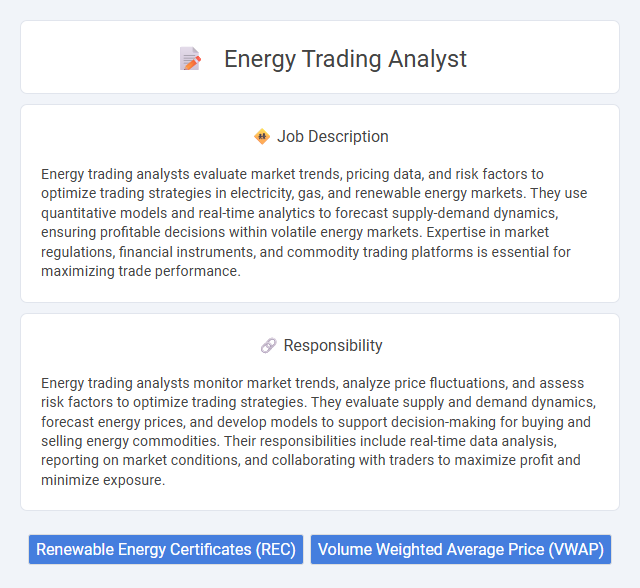
Energy trading analysts evaluate market trends, pricing data, and risk factors to optimize trading strategies in electricity, gas, and renewable energy markets. They use quantitative models and real-time analytics to forecast supply-demand dynamics, ensuring profitable decisions within volatile energy markets. Expertise in market regulations, financial instruments, and commodity trading platforms is essential for maximizing trade performance.
Energy trading analyst roles likely suit individuals who thrive in high-pressure environments and possess strong analytical skills, as the job demands quick decision-making based on fluctuating market data. Candidates comfortable with complex financial models and risk assessment probably find this career fulfilling due to its focus on forecasting energy prices and market trends. Those preferring routine tasks or low-stress settings may find the dynamic and fast-paced nature of energy trading less compatible with their work style.
Qualification
Energy trading analysts require strong analytical skills, proficiency in data modeling, and expertise in energy markets and trading platforms such as Eikon or Bloomberg Terminal. A bachelor's degree in finance, economics, engineering, or a related field is essential, often complemented by certifications like CFA or energy risk management credentials. Advanced Excel, Python, or SQL skills enhance the ability to forecast market trends and optimize trading strategies effectively.
Responsibility
Energy trading analysts monitor market trends, analyze price fluctuations, and assess risk factors to optimize trading strategies. They evaluate supply and demand dynamics, forecast energy prices, and develop models to support decision-making for buying and selling energy commodities. Their responsibilities include real-time data analysis, reporting on market conditions, and collaborating with traders to maximize profit and minimize exposure.
Benefit
Energy trading analyst roles likely offer significant financial benefits through performance-based bonuses and competitive salaries, reflecting the high-stakes nature of market analysis. Access to cutting-edge trading platforms and industry insights probably enhances career growth and skill development. Opportunities to work in dynamic, fast-paced environments may increase job satisfaction and long-term professional success.
Challenge
Energy trading analysts face the challenge of navigating highly volatile markets influenced by fluctuating supply and demand, geopolitical tensions, and regulatory changes. They are likely required to interpret complex data quickly to forecast price movements accurately and manage risks effectively. The probability of encountering unforeseen market disruptions means analysts must continuously adapt strategies to maintain optimal trading performance.
Career Advancement
Energy trading analysts play a crucial role in monitoring market trends, analyzing trading data, and advising on energy commodity transactions, which positions them for rapid career growth. Mastery of data analytics, risk management, and regulatory knowledge enhances prospects for advancing to senior trader, portfolio manager, or risk director roles. Continuous skill development in algorithmic trading and familiarity with renewable energy markets significantly boosts opportunities for career progression in this dynamic sector.
Key Terms
Renewable Energy Certificates (REC)
Energy trading analysts specializing in Renewable Energy Certificates (RECs) monitor market trends, pricing, and regulatory changes to optimize the buying and selling of RECs within energy markets. They analyze data on renewable energy generation, compliance requirements, and credit tracking systems to ensure accurate valuation and risk management in trading strategies. Proficiency in market analytics, policy frameworks, and sustainability metrics is essential for maximizing profitability and supporting corporate renewable energy goals.
Volume Weighted Average Price (VWAP)
Energy trading analysts leverage Volume Weighted Average Price (VWAP) to optimize trade execution and assess market liquidity in energy markets. VWAP serves as a critical benchmark, enabling analysts to evaluate intraday price trends and improve decision-making on electricity, natural gas, and oil transactions. Mastery of VWAP integration supports risk management and enhances profitability in volatile energy trading environments.
 kuljobs.com
kuljobs.com